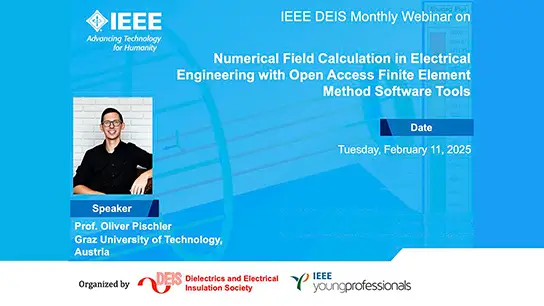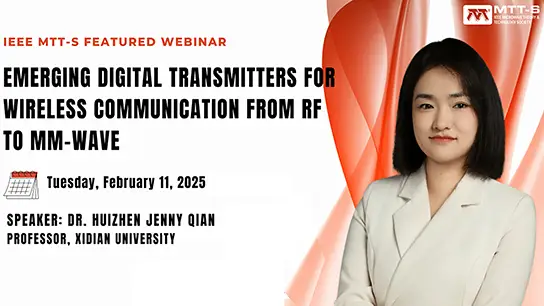-
Members: FreeSSCS
IEEE Members: Free
Non-members: FreePages/Slides: 4
12 Nov 2018
Abstract
In CMOS amplifiers, component mismatch can easily give rise to offsets of several millivolts. However, this can be reduced to the microvolt level by the application of chopping. Compared to the alternatives, i.e. increasing device area or trimming, the use of chopping has the added advantage of also suppressing 1/f noise and drift. In this webinar, a high-speed introduction to the fundamentals of chopping will be given.
Speaker Biography
Kofi A. A. Makinwa (M�97�SM�05�F�11) received the B.Sc. and M.Sc. degrees from Obafemi Awolowo University, Ife, Nigeria, in 1985 and 1988, respectively, the M.E.E. degree from the Philips International Institute, Eindhoven, The Netherlands, in 1989, and the Ph.D. degree from Delft University of Technology, Delft, The Netherlands, in 2004.
From 1989 to 1999, he was a Research Scientist with Philips Research Laboratories, Eindhoven, The Netherlands, where he worked on interactive displays and digital recording systems. In 1999, he joined the Delft University of Technology, where he is currently an Antoni van Leeuwenhoek Professor and Head of the Microelectronics Department. He has authored 15 books and over 250 technical papers, and holds 26 patents. His research interests include the design of mixed-signal circuits, sensor interfaces and smart sensors.
Dr. Makinwa is the Analog Subcommittee Chair of the International Solid-State Circuits Conference (ISSCC). He also serves on the program committees of the VLSI Symposium, the European Solid-State Circuits Conference (ESSCIRC), and the Advances in Analog Circuit Design (AACD) workshop. He has been a three-time Guest Editor of the Journal of Solid-State Circuits (JSSC) and a Distinguished Lecturer of the IEEE Solid-State Circuits Society. For his doctoral research, he received the 2005 Simon Stevin Gezel Award from the Dutch Technology Foundation. He is a co-recipient of 15 best paper awards from the JSSC, ISSCC, VLSI, ESSCIRC and Transducers, among others. At the 60th anniversary of ISSCC, he was recognized as a top-10 contributor. He is a member of the Royal Netherlands Academy of Arts and Sciences, an alumnus of its Young Academy, a member of the editorial board of the Proceedings of the IEEE, and a former elected member of the AdCom of the IEEE Solid-State Circuits Society.
In CMOS amplifiers, component mismatch can easily give rise to offsets of several millivolts. However, this can be reduced to the microvolt level by the application of chopping. Compared to the alternatives, i.e. increasing device area or trimming, the use of chopping has the added advantage of also suppressing 1/f noise and drift. In this webinar, a high-speed introduction to the fundamentals of chopping will be given.
Speaker Biography
Kofi A. A. Makinwa (M�97�SM�05�F�11) received the B.Sc. and M.Sc. degrees from Obafemi Awolowo University, Ife, Nigeria, in 1985 and 1988, respectively, the M.E.E. degree from the Philips International Institute, Eindhoven, The Netherlands, in 1989, and the Ph.D. degree from Delft University of Technology, Delft, The Netherlands, in 2004.
From 1989 to 1999, he was a Research Scientist with Philips Research Laboratories, Eindhoven, The Netherlands, where he worked on interactive displays and digital recording systems. In 1999, he joined the Delft University of Technology, where he is currently an Antoni van Leeuwenhoek Professor and Head of the Microelectronics Department. He has authored 15 books and over 250 technical papers, and holds 26 patents. His research interests include the design of mixed-signal circuits, sensor interfaces and smart sensors.
Dr. Makinwa is the Analog Subcommittee Chair of the International Solid-State Circuits Conference (ISSCC). He also serves on the program committees of the VLSI Symposium, the European Solid-State Circuits Conference (ESSCIRC), and the Advances in Analog Circuit Design (AACD) workshop. He has been a three-time Guest Editor of the Journal of Solid-State Circuits (JSSC) and a Distinguished Lecturer of the IEEE Solid-State Circuits Society. For his doctoral research, he received the 2005 Simon Stevin Gezel Award from the Dutch Technology Foundation. He is a co-recipient of 15 best paper awards from the JSSC, ISSCC, VLSI, ESSCIRC and Transducers, among others. At the 60th anniversary of ISSCC, he was recognized as a top-10 contributor. He is a member of the Royal Netherlands Academy of Arts and Sciences, an alumnus of its Young Academy, a member of the editorial board of the Proceedings of the IEEE, and a former elected member of the AdCom of the IEEE Solid-State Circuits Society.


